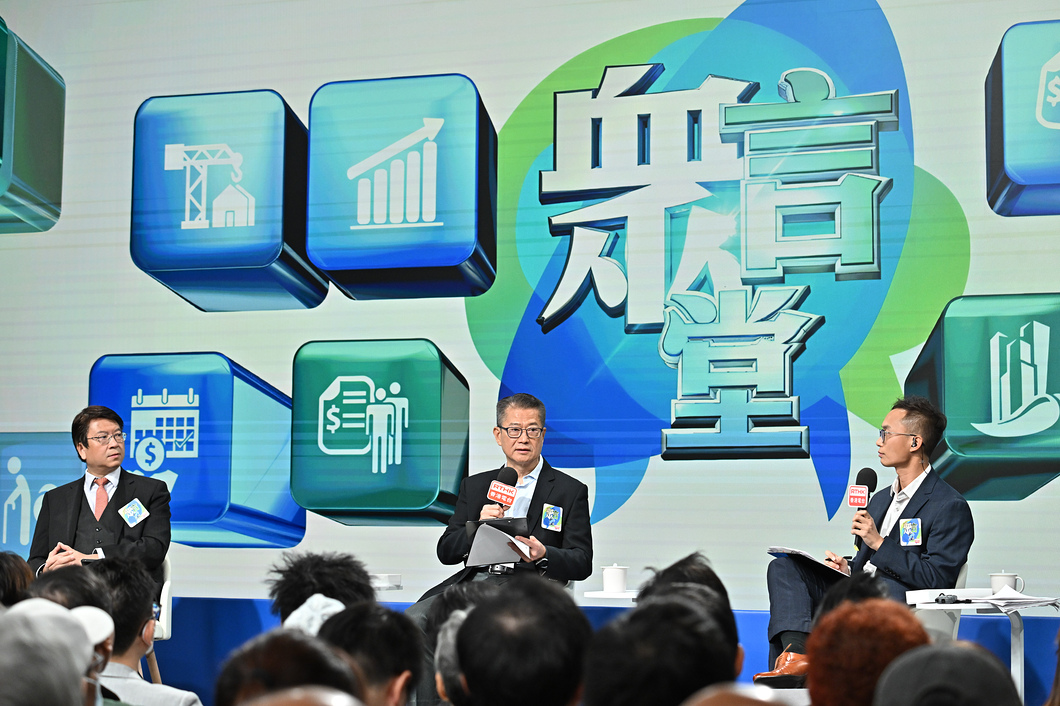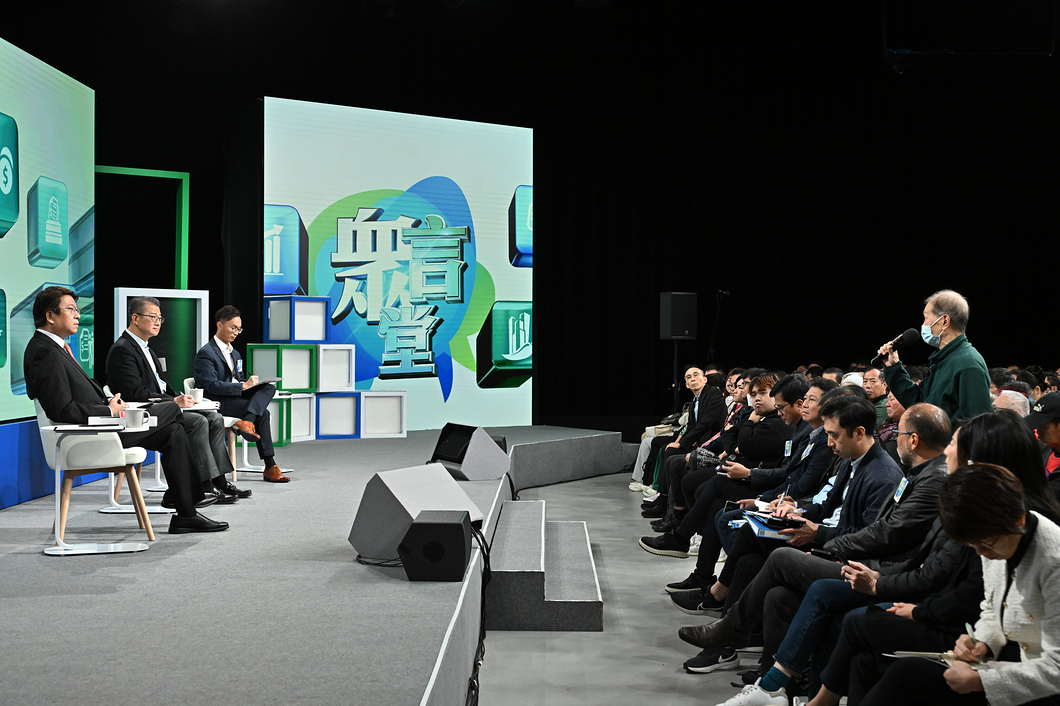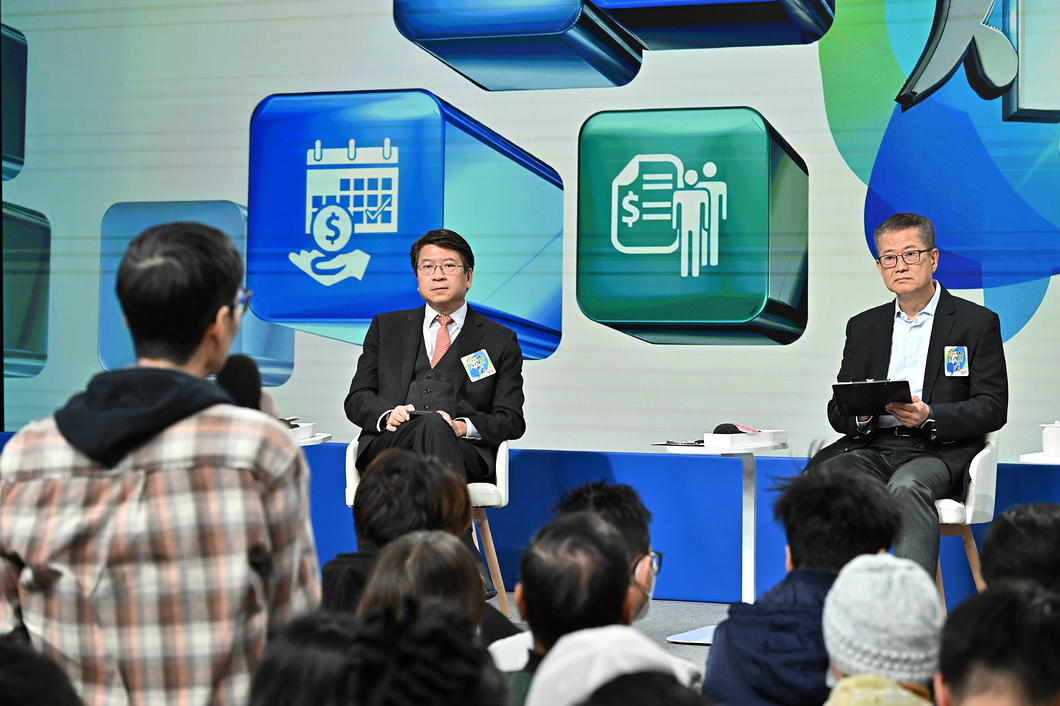Blog
Striving for Development and Using Resources Wisely
As we enter 2025, everyone is focused on advancing their work agendas. We are also pressing ahead with various initiatives, including conducting public consultation for the upcoming Budget. In the recent couple of months, we have engaged with different sectors and communities to gather insights and opinions, aiming to harness collective wisdom to address challenges and seize opportunities ahead.
We are fully committed to strengthening the economy and pursuing development, aiming to accelerate economic growth that benefits all. Given the challenges we face in public finance, it is essential to adopt a comprehensive strategy. During the budget consultation, members of the public have shown great interest in these two key issues.

|
| I attended RTHK’s programme "Voices from the Hall" yesterday and exchanged views with members of the public on the coming Budget, with a view to tapping their wisdom. |
Yesterday, I participated in RTHK’s programme “Voices from the Hall”. Many participating members of the public expressed interest about Hong Kong’s economic situation and development. They offered concrete suggestions for promoting the growth of various industries and creating more business opportunities. Many emphasised the need for Hong Kong to attract more tourists, and encourage both visitors and residents to spend in the city. They also recognised the need to draw in more capital, thereby reinforcing the positive momentum observed in recent months.
Only through better economic development can we generate the resources needed to support various social services, and create more and better job opportunities for our residents. At the same time, we must address issues related to the sustainability of public finance. These are crucial for the stability of our economy and society, as well as for the ongoing enhancement of social services.
In the past two financial years, we experienced budget deficits primarily due to the significant spending related to the pandemic. The high-interest environment and geopolitical factors influenced capital flows and constrained the local asset market, adversely impacting revenues from related sources. On the other hand, the structure of certain expenditure areas requires review. Given the cumulative effects of these factors, the projected consolidated deficit for this financial year (2024-25), including proceeds from bond issuance, is expected to be under HK$100 billion.

|
| I attended RTHK’s programme "Voices from the Hall" yesterday and exchanged views with members of the public on the coming Budget, with a view to tapping their wisdom. |

|
| I attended RTHK’s programme "Voices from the Hall" yesterday and exchanged views with members of the public on the coming Budget, with a view to tapping their wisdom. |
The key to improving the public finance situation lies in identifying new revenue sources while managing expenditure growth. Our strategy focuses on the latter. On the premise that public services would be maintained and improved, it is essential to control the growth of recurrent expenditures. As a matter of fact, many countries facing significant deficits after the pandemic have opted to control expenditure as their main approach to gradually narrowing the fiscal gap.
Meanwhile, we will prioritise public works projects based on their urgency and significance, and adjust implementation timelines as appropriate. In terms of resources, priority will be given to the Northern Metropolis and other initiatives related to economic development and housing. We will also make good use of debt issuance and public-private partnerships to harness market capital for advancing these infrastructure projects. These measures aim to capitalise on development opportunities and create avenues for new economic growth drivers that can be translated into taxes and other revenues.
In last year’s Budget, we proposed a comprehensive fiscal consolidation programme which includes reducing recurrent expenditures by 1% annually for this financial year and the next two. Given the current economic and fiscal circumstances, we are considering enhancing our fiscal consolidation efforts to further contain expenditure growth. These include requiring various government departments to reassess their resource allocations and work priorities in order to better meet societal needs.
On the other hand, the expenditure growth associated with individual subsidy schemes has created significant long-term pressure on the Government’s fiscal position. This necessitates a review of their operational models. We have received a range of opinions from the community on this matter, including suggestions on how to ensure the sustainability of these schemes.
In light of advancements in innovation and technology, we are promoting the broader application of technologies within the Government and enhancing civil servants’ related skills, with a view to optimising service efficiency and improving service delivery.
In terms of seeking new revenue sources, we have several important considerations when weighing different options. We must take into account the actual situation in the society and avoid moving too quickly to prevent undermining the momentum of economic recovery. It is crucial to maintain Hong Kong’s competitive advantage of a simple and low tax system. However, it is equally important to adhere to the principle that those who could afford should pay more, thus minimising the impact on ordinary members of the public. The hotel accommodation tax and the two-tiered standard rates regime for salaries tax, announced in last year’s Budget and now implemented, reflect this approach.
I firmly believe that by embracing diverse perspectives, collaborating with the community, and continuously engaging in reform while seizing the opportunities presented by challenges, we can unlock new horizons for Hong Kong’s future development.
January 5, 2025